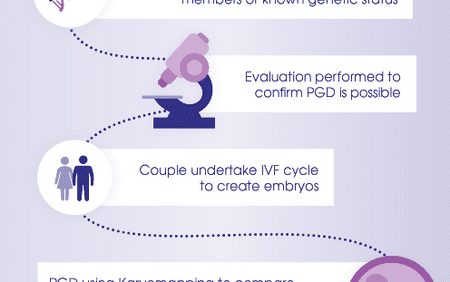Preimplantation Genetic Testing for Single Gene Disorders
What is preimplantation genetic testing for single gene disorders?
Preimplantation genetic testing (PGT-M) is a highly sophisticated scientific technique to test embryos for the presence of a single gene (monogenic) disorder. This allows embryos that are not affected by a specific disorder to be selected for embryo transfer during an IVF cycle, preventing the condition from being passed on to any future children.
At Melbourne IVF, most PGT-M is performed using Karyomapping. Melbourne IVF is the first fertility clinic in the Southern Hemisphere to offer karyomapping, a new form of genetic test which can be developed in weeks rather than months.
Read about Australia's first birth's from karyomapping »
The cost of PGT can vary depending on your individual circumstances. A new Medicare rebate is now available for eligible couples and individuals, for pre-implantation genetic testing (PGT) of embryos for specific genetic or chromosomal variations prior to implantation. To find out if you may be eligible to receive the rebate please see the Medicare criteria via our FAQ's here.
If you have any questions about the cost of pre-implantation genetic testing with Melbourne IVF please discuss this with your IVF specialist or genetic counsellor.
Is PGT-M suitable for me?
PGT-M may be suitable if you are at an increased risk of having a child with an inherited genetic condition.
PGT-M can test for a large number of single gene disorders including:
- Huntingtons’ disease
- Cystic fibrosis
- Thalassaemia
- Duchenne muscular dystrophy
- Fragile-X
- BRCA1/BRCA2 (hereditary breast/ovarian cancer)
PGT-M is only possible where the exact gene mutation, causing the genetic disorder, has been identified.
There are some disorders where, although it is apparent from the family history that is cause is genetic, the exact gene is simply not known.
In this case, single gene PGT-M can probably not help. Most couples at risk of having a child with a single gene disorder will be able to have PGT-M.
How does PGT-M work?
The length of time taken for the assessment phase will depend on how much genetic information is already available. It is very important to bring as much information as you have to these visits including any test results and family history.
Analysis of the DNA samples will take approximately four-six weeks to establish whether PGT-M is appropriate.
The results of the genetic testing on embryo samples will be available within 10 working days of the sample received by the genetics laboratory.

How much does PGT-M cost?
An IVF cycle with PGT-M has three components of cost:
- The cost of the IVF cycle
- The cost of the hospital stay
- The cost of the PGT-M technology
If your treatment involves PGT-M, at Melbourne IVF, these services are charged in addition to your IVF cycle cost.
For the most up to date costs, visit the costs page.
Exclusion testing
Some people have a parent affected by a serious genetic condition, such as Huntington's disease, that does not generally manifest until later in life. Many people do not want to have testing to determine if they have inherited that condition from their parent, however do not want to risk passing it on to their own children.
PGT-M can be used to perform exclusion testing. In exclusion testing the genetic error is not tested for but embryos are tested to make sure they have not inherited the ‘at risk’ gene from the member of the family who has the condition.What is preimplantation genetic testing for structural rearrangements? (PGT-SR)
PGT-SR is a form of genetic testing that is used for people who have a chromosome structural rearrangement, such as a chromosome translocation.
In some people, part of one chromosome attaches to the end of another, or pieces of chromosomes may break off and be swapped around so although that person has a normal complement of chromosomes their embryos could inherit missing or extra pieces of chromosome. This is known as ‘unbalanced translocation’.
Embryos with unbalanced translocations usually do not implant, miscarry or rarely, result in the birth of a child with severe variations. PGT-SR can detect unbalanced translocations, as well as errors of all other chromosomes in a developing embryo.Can PGT be used for gender selection?
Some genetic conditions affect one gender, for example haemophilia and muscular dystrophy.
Sometimes it is not possible to detect the exact genetic error that causes the disease and PGT is used to determine the gender of embryos and any errors of all other chromosomes. Then, the embryos of the required gender and with the correct number of chromosomes will be transferred.
Gender selection is prohibited in Victoria for family balancing or anything other than medical reasons.
How much does PGT for gender selection cost?
If your treatment involves PGT-SR, at Melbourne IVF, these services are charged in addition to your IVF cycle cost.
For the most up to date costs, visit the costs page.
There is no Medicare rebate associated with PGT-SR and gender selection. However, your final costs may vary depending on your individual circumstances.
If you have any questions about the cost of Preimplantation genetic testing with Melbourne IVF please phone 1800 111 483 or complete the form below.